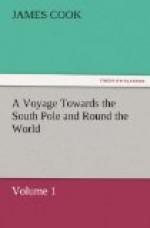On the 7th, early in the morning, while the ships were unmooring, I went to pay my farewell visit to Oree, accompanied by Captain Furneaux and Mr Forster. We took with us for a present, such things as were not only valuable, but useful. I also left with him the inscription plate he had before in keeping, and another small copper-plate, on which were engraved these words: “Anchored here, his “Britannic Majesty’s ships Resolution and Adventure, September, 1773,” together with some medals, all put up in a bag; of which the chief promised to take care, and to produce to the first ship or ships that should arrive at the island. He then gave me a hog; and, after trading for six or eight more, and loading the boat with fruit, we took leave, when the good old chief embraced me with tears in his eyes. At this interview nothing was said about the remainder of Mr Sparrman’s clothes. I judged they were not brought in; and for that reason did not mention them, lest I should give the chief pain about things I did not give him time to recover; for this was early in the morning.
When we returned to the ships, we found them crowded round with canoes full of hogs, fowls, and fruit, as at our first arrival. I had not been long on board, before Oree himself came to inform me, as we understood, that the robbers were taken, and to desire us to go on shore, either to punish, or to see them punished; but this could not be done, as the Resolution was just under sail, and the Adventure already out of the harbour. The chief stayed on board till we were a full half league out at sea; then took a most affectionate leave of me; and went away in a canoe, conducted by one man and himself; all the others having gone long before. I was sorry that it was not convenient for me to go on shore with him, to see in what manner these people would have been punished; for I am satisfied, this was what brought him on board.
During our short stay at the small but fertile isle of Huaheine, we procured to both ships not less than three hundred hogs, besides fowls and fruits; and, had we stayed longer, might have got many more: For none of these articles of refreshment were seemingly diminished, but appeared every where in as great abundance as ever.
Before we quitted this island, Captain Furneaux agreed to receive on board his ship a young man named Omai, a native of Ulietea; where he had had some property, of which he had been dispossessed by the people of Bolabola. I at first rather wondered that Captain Furneaux would encumber himself with this man, who, in my opinion, was not a proper sample of the inhabitants of these happy islands, not having any advantage of birth, or acquired rank; nor being eminent in shape, figure, or complexion: For their people of the first rank are much fairer, and usually better behaved, and more intelligent, than the middling class of people, among whom Omai is to be ranked. I have, however, since my arrival in England, been convinced of my




